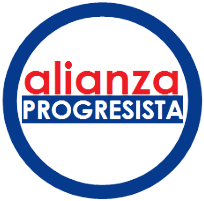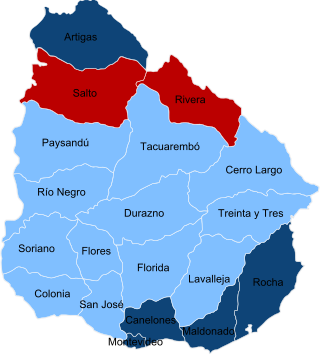
The Socialist Party is a centre-left political party in Argentina. Founded in 1896, it is one of the oldest still-active parties in Argentina, alongside the Radical Civic Union.

The Broad Front is a centre-left peronist political party in Argentina most prominent in the 1990s. The party is currently part of the ruling Frente de Todos coalition supporting the 2019 Argentine presidential candidate Alberto Fernandez during the 2019 Argentine general election.

The Broad Front is a left-wing political coalition from Uruguay. It was the ruling party of Uruguay from 2005 to 2020 and has produced two presidents: José Mujica (2010–2015) and Tabaré Vázquez. Since 1999, it has been the largest party in Uruguay's General Assembly.
Gonzalo Aguirre Ramírez was a Uruguayan politician, lawyer, and newspaper columnist. He served as Vice President of Uruguay from 1990 to 1995.
Hugo Batalla Parentini, Uruguayan politician, was Vice President of Uruguay from 1995 to 1998 during the presidency of Julio María Sanguinetti.

The municipal elections held on May 14, 2000, resulted in the consolidation of the EP-FA as the most popular party, a strong recovery for the Partido Nacional after its worst ever performance in the 1999 general elections, and a slight drop of support for the incumbent Partido Colorado of President Jorge Batlle.

The Progressive Alliance(Spanish: Alianza Progresista) is a social-democratic political party of Uruguay founded in 1999 by the former Vice President Rodolfo Nin Novoa, and since its foundation, it is part of the Frente Amplio.

Ana María Olivera Pessano is an Uruguayan professor and politician belonging to the Communist Party – Broad Front. Since February 15, 2020 she serves as National Representative for Montevideo. Previously, she held the position of Deputy Minister of Social Development and Intendant of Montevideo, being the first woman to be elected to that position. Her mandate as Intendant ran from July 8, 2010, to July 9, 2015, when she was succeeded by Daniel Martínez.

Alba Roballo was a Uruguayan lawyer, poet, and politician, who served three consecutive terms from 1958 to 1971 in the Senate of Uruguay and a fourth term in the early 1990s. After graduating with a law degree from the Universidad de la República in Montevideo, she began to write. In 1942, her first book, Se levanta el sol, won first prize from the Ministry of Education. Later she founded two journals, Mujer Batllista and El Pregón. In 1954 she became the first woman to sit on the Montevideo Departmental Council and was elected Senator for the Colorado Party. A prominent Afro-Uruguayan, she was the first woman in South America to serve as a cabinet minister, appointed in 1968; she resigned this post following authoritarian actions by the government. She was a founder of the Frente Amplio in 1971 and though she ran for re-election, that year she was defeated.

Uruguay's local government elections, held on May 9, 2010, to elect the intendente of the 19 departments that are the administrative divisions of Uruguay, resulted in losses for the Frente Amplio government, and some gains for the opposition Partido Nacional and Partido Colorado. This was the first time that another level of government was elected as well: 89 local governments.

Uruguay held local government elections on May 10, 2015, electing the intendente of the 19 departments that are the administrative divisions of Uruguay, as well as 112 local governments.

Broad Left Front is a political coalition of leftist parties and movements in Peru.

General elections were held in Uruguay on Sunday, 27 October 2019 to elect the President and General Assembly. As no presidential candidate received a majority in the first round of voting, a runoff election took place on 24 November.
Presidential primary elections were held in Uruguay on 28 June 2009 in order to nominate the presidential candidate for every political party.

Partido Unión Republicana was a political party in Puerto Rico. The party formed in early 1932 from the merger of Partido Republicano Puro and Partido Alianza Puertorriqueña. Its president was Rafael Martínez Nadal. It existed from 1932 to 1940. After the 1936 elections, Partido Unión Republicana reconstituted itself as Partido Unión Republicana Progresista.

Uruguay held local government elections on September 27, 2020, to elect the intendente of the 19 departments that are the administrative divisions of Uruguay, as well as 31 councilors; and a mayor and four councilors for each of the municipalities. Across the country, 19 intendants, 589 ediles, 125 mayors and 500 councilors will be elected. This will be the second time that both intendentes and alcaldes are elected simultaneously.












